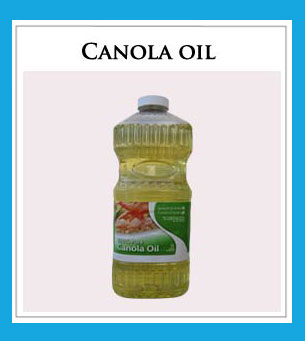
Canola Oil
Eric Roehm, M.D. 2011
Canola oil comes from a plant bred from the rapeseed plant. The rapeseed plant is part of the mustard family which includes turnips, cabbage, broccoli, and cauliflower
In Canada, in the early 1970s, traditional plant breeding techniques using the original rapeseed plant were employed to create a plant producing oil low in erucic acid and high in oleic acid (a type of monounsaturated fatty acid found in olive oil).
For marketing purposes, oil from this plant was called Canola oil (Canadian Oil Low Acid).
The original rapeseed oil contains a high percentage of erucic acid, with levels as high as 45%.1 In contrast, erucic acid levels in canola oil are less than 2%. Reducing erucic acid is thought to be important because the high erucic acid content of the original rapeseed oil induced severe cardiac abnormalities in certain animal models. In contrast, the consumption of canola oil (the low erucic acid oil) does not produce these abnormalities.2
Canola oil has a favorable composition of fatty acids. Canola oil is predominantly composed of 63% oleic acid (a monounsaturated fatty acid), 21% linoleic acid, 9% from alpha linolenic acid (a potentially beneficial “plant omega-3 fatty acid”), and 7% saturated fatty acids3.
In recent years, trans fatty acid levels in canola oil sold in stores have been low and reflect the manufacturing process when trans fatty acids can be introduced. A recent value for trans fatty acids in the type of canola oil available in grocery stores was measured to be 0.4%, which is low.3
Two sources of information besides a favorable fatty acid profile suggest that canola oil may be beneficial to human health. Neither looks at canola oil alone, but rather as part of a multifaceted nutritional approach for improving health through reducing cardiovascular disease.
1. The first is the Lyon Diet Heart Study4,5 (see Mediterranean diet video) which was a randomized trial of a diet modeled after the Cretan Mediterranean diet involving patients with a prior heart attack. In the traditional Cretan Mediterranean diet, a very large quantity of olive oil is consumed, but the researchers designing the trial didn’t think this would be adhered to by participants unaccustomed to a very high olive oil intake. The researchers therefore encouraged both olive oil and canola oil in order to increase plant based monounsaturated fat intake in the Mediterranean diet group. (The Mediterranean diet group consisted of multiple other dietary components as well, including less saturated fat, and more fruits, vegetables, legumes, and whole grain carbohydrates.)
The group assigned to the Mediterranean diet, which in this trial included the regular intake of canola oil, had a significant decrease in death and heart attacks5. Whether canola oil played a significant role in this beneficial outcome is not known. However, the researchers speculated that canola oil was an important factor in the observed benefit on the basis of canola oil providing a significant source of plant based omega-3 fat.
2. The second instance where canola oil was part of a dietary approach showing benefit was a nationwide dietary intervention involving the country of Finland.6 In the 1960’s, Finland had one of the highest death rates from heart attacks and related complications in the world.7 There was a national effort using Finnish national guidelines and interventions for dietary change disseminated throughout the country with the support of many voluntary organizations, including the Finnish Heart Association.
The Finnish diet changed substantially in the time period of 1972-1992.6 Saturated fat intake in the form of butter and whole milk markedly decreased. Use of canola based margarines and canola oil for cooking became widespread throughout the country (canola oil- low erucic acid rapeseed oil). Plant based monounsaturated fat and polyunsaturated fat intake increased. In addition, fruit consumption doubled and vegetable consumption tripled during this time.
During this same time interval of 1972-1992 in Finland, coronary heart disease mortality (deaths resulting from fat and cholesterol blockages of the arteries of the heart) was reduced by 55% in men and 68% in women.6
Again, it can not be said with certainty what caused the decrease in heart disease. However, a decrease in the saturated fat intake found in dairy products combined with an increase in the ingestion of canola oil, vegetables, and fruits were associated with a beneficial outcome.
The weight of the available evidence suggests canola oil is beneficial as part of a healthy diet.
References:
1. Sahasrabudhe M. Crismer values and erucic acid contents of rapeseed oils. Journal of the American Oil Chemists’ Society 54:8,p323-324.
2. Vles R, Bijster G, Timmer W. Nutritional evaluation of low-erucic-acid rapeseed oils. Arch Toxicol Suppl. 1978;(1):23-32.
3. USDA National Nutrient Database for Standard Reference, SR-23. 2010.
4. Renaud S, de Lorgeril M, Delaye J, et al. Cretan Mediterranean diet for prevention of coronary heart disease. Am J Clin Nutr 1995;61(suppl):1360S-7S.
5. de Lorgeril M, Renaud S, Mamelle N, et al. Mediterranean alpha-linolenic acid-rich diet in secondary prevention of coronary heart disease. Lancet. 1994;343:1454-9.
6. Pietinen P, Vartianen E, Seppanen R, et al. Changes in Diet in Finland from 1972 to 1992: Impact on Coronary Heart Disease Risk. Preventive Medicine 1996:25:243-50.
7. Keys A. Coronary heart disease in seven countries. New York: Monograph No. 29. Am Heart Assoc 1970.
